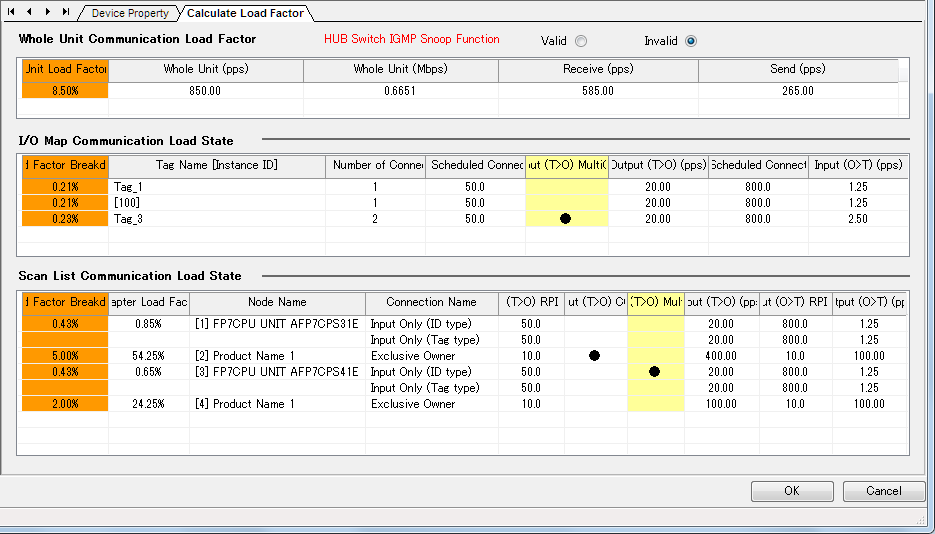The load factor is calculated from the EDS information [Capacity] of each adapter and scanner.
When EDS information is not registered, Impossible to calculate is displayed.

Calculation procedures
Calculating the number of communication packets sent/received per second (pps)
Calculate from RPI. * pps = 1000 ¸ RPI [ms]
When the Change of State (COS) trigger is set, it is calculated as a communication cycle RPI x 1/4.
When the HUB Switch IGMP Snoop Function is Invalid and the connection type is Point to Point, multicast communication packets (pps) are added.
ExampleFor a connection when RPI is 0.5 [ms]
1000 ¸ 0.5 = 2000 pps
For a connection when RPI is 0.5 [ms] and the COS trigger is set
1000 ¸ (0.5 x (1/4)) = 500 pps
Calculating multicast communication packets (pps)
The calculation method is the same as the calculation procedure 1.
Packets that Multicast Communication is set to Yes in the I/O map setting and the connection type is MultiCast in the connection setting are to be calculated.
Calculating the cyclic communication allowable communication band (pps)
Calculate from the data size per packet and EDS information [Capacity] for adapters and scanners.
Data size per packet
Connection transmission/reception data size = Raw data size + 32-bit header size
Without 32-bit header: 2 bytes
With 32-bit header: 6 bytes
2 to 510 bytes: 10000 pps
- 511 to 1450 bytes: 5000 ppsExample
When the connection transmission raw data size is 256 bytes without 32-bit header
(256 + 2) = 258 bytes £ 510 Þ 10000 pps
When the connection transmission raw data size is 512 bytes with 32-bit header
(512 + 6) = 518 bytes ³ 511 Þ 5000 pps
Calculating the unit communication load factor from the number of sent/received packets (pps) and sent/received data size
ExampleWhen the sent data size is 256 bytes and the received data size is 36 bytes
No. of sent packets (2000 pps) ¸ 10000 pps x 100% = 20%
No. of received packets (125 pps) ¸ 10000 pps x 100% = 1.25%
ÞThe unit communication load factor is (20% + 1.25% = 21.25%).
